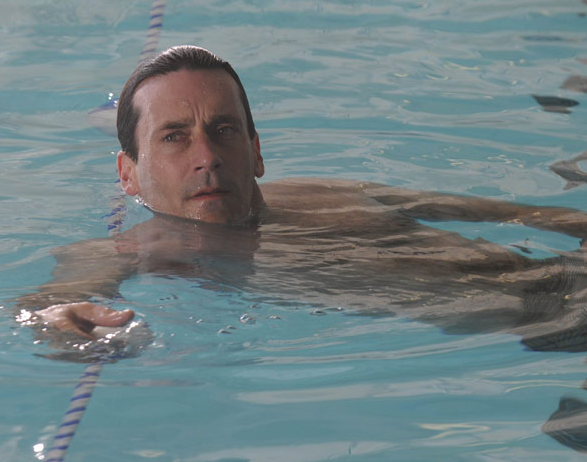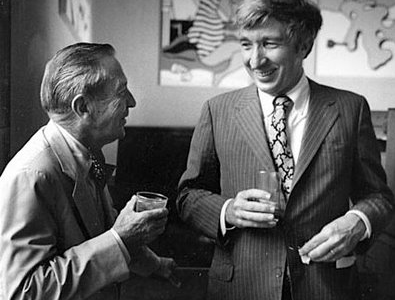Footnotes of Mad Men: The Swimmer
by Natasha Vargas-Cooper

Watching Don Draper emerge from chlorinated baptismal waters, gasping for breath in a cavernous public gym, brings to mind John Cheever’s short story “The Swimmer,” from 1964. “I’ve been a little out of sorts, lately,” Don confesses to his date. Likewise Cheever’s main character, Ned Merrill. Beginning at the public pool, Ned, in an attempt discover Bullet Park’s hidden topography, decides to swim through the private and public schools of his Westchester neighborhood, creating an aquatic trail back to his home. Ned starts the expedition with great hope, as he enjoys the sensation of swimming: “He had been swimming and now he was breathing deeply, stertorously as if he could gulp into his lungs the components of that moment, the heat of the sun, the intenseness of his pleasure.”
Things turn dark when he encounters the drained pool in the backyard of an emptied home of his neighbors. Ned can’t remember where they had gone and feels a creeping despair: “Was his memory failing,” Ned wonders as he plods barefoot through the overgrown lawn, “or had he so disciplined it in the repression of unpleasant facts that he had damaged his sense of the truth?” The more Ned swims, the more comes to light through the comments of his neighbors, some welcoming, others offering pitying condolences for all Ned’s troubles at home. Here emerges a constant Cheever theme and one of the great paradoxes of greater New York: where the separation between city apartment buildings can be as narrow as a pencil, there is great anonymity, whereas in the seclusion of the suburbs, behind fences, we can find ourselves the most exposed.
It’s in suburbia where Don faces his most punishing humiliations, like the remnants of his former life packed into musty boxes, piled on the sidewalk as his ex-wife’s new husband plows the front yard, without a glance or a word as Don loads up his car to return to the city, further asserting the quiet cruelty of Ossining.
Here is the best passage from “The Swimmer” with some nice parallels:
The next pool on his list, the last but two, belonged to his old mistress, Shirley Adams. If he had suffered any injuries at the Biswangers’ they would be cured here. Love-sexual roughhouse in fact-was the supreme elixir, the pain killer, the brightly colored pill that would put the spring back into his step, the joy of life in his heart. They had had an affair last week, last month, last year. He couldn’t remember, It was he who had broken it off, his was the upper hand, and he stepped through the gate of the wall that surrounded her pool with nothing so considered as self-confidence. It seemed in a way to be his pool, as the lover, particularly the illicit lover, enjoys the possessions of his mistress with an authority unknown to holy matrimony. She was there, her hair the color of brass, but her figure, at the edge of the lighted, cerulean water, excited in him no profound memories. It had been, he thought, a lighthearted affair, although she had wept when he broke it off. She seemed confused to see him and he wondered if she was still wounded. Would she, God forbid, weep again?
I won’t spoil the end for you, but like Don about swimming, “you get wrung out.”

“That sad bastard,” is how Francine’s husband, the philanderer, describes Don Draper. The same could be said about Cheever and he would be the first one to tell you that. Like Don, he kept a journal. A collection of his journal entries were eventually published, to much chatter, given that the journals were remarkably dishy (turns out Cheever was a bisexual who thought his daughters chubby and his son a sissy) and soaked in pathos. Cheever was in constant despair about the doubleness of his life; the competing desires for comfort and tradition couple with an impulse to assail the conventions of wealth and family life.
Here’s a passage where he describes his weary frustrations in his latter years while on vacation:
The redness of the marshes makes the blueness of the water seem to be a thrusting force, and the splendor of the landscape is emphatic; but I am an old, old man — and it was so different in my youth — who finds that the bounty and splendor of the world fail to cleanse the thoughts of his heart. My heart is in some motel room, howling at a consummate lewdness.
All this belongs to time that has already passed by Don Draper and his cohorts, though these are concerns of and preoccupations of the Great White Male in literature. David Foster Wallace argued that Cheever, like John Updike, Phillip Roth, Norman Mailer, and Frederick Exley were a league of extraordinary narcissists, whose erudite, philandering, self-pitying protagonists, Wallace claims, were actually stand-ins for the authors. Never attached to any cause, lover, or clan, the individualism of Cheever’s characters, like Ned, may have at one time seemed heroic but are despicable today. They don’t face the great horror: “the prospect of dying without ever having loved something more than yourself.”
Cheever wrote about the stultification of affluence and comfort, his ambition to be recognized as a scribe of his generation and also of humiliating himself at garden parties because he was drunk, cheating on his wife, and disappointing his children. Until he died, John Cheever considered himself lonely.
Previously: Footnotes of Mad Men: The Promethean Woman, or, Our Dog in the Parthenon
You can always find more footnotes by Natasha Vargas-Cooper right here, or, you know, you can get a whole book of ‘em.
